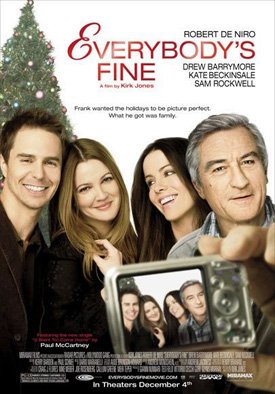
EVERYBODY’S FINE
US, 2009, 99 minutes, Colour.
Robert de Niro, Drew Barrymore, Kate Beckinsale, Sam Rockwell, James Frain, Melissa Leo.
Directed by Kirk Jones.
In recent years, Robert di Niro has seemed more eccentric and mannered on the screen, whether it be as the father in the Focker films or in some of his crime dramas like righteous Kill. It is a pleasure to see him rather underplaying his role here.
He is Frank Goode, a recent widower and misses his wife dearly. She had been the point of contact for his family, two daughters and two sons. He does his daily routines and spends a lot of time in the garden. He decides to invite the children for the weekend, a chance to see them and for them to see one another. And, of course, they ring with their various excuses that they cannot come. He makes up his mind to visit them.
This is an American adaptation of an Italian film, Stanno Tutti Bene, Everybody's Fine, by Giuseppe Tornatore, made after his Oscar-winning and popular Cinema Paradiso. Marcello Mastroianni was the star of the Tornatore film, an eminent star of Italian cinema as De Niro still is of American cinema.
The film becomes a road movie (Frank's health means that he has to travel by bus rather than plane, though when he finally travels by plane, his fears and his health are a dangerous combination). He has an artist son living in New York City. He is not home. The audience knows more than Frank, that the son has been involved in drug difficulties in Mexico. Off to Chicago to see his older daughter (Kate Beckinsale), married with a son. They all put up a good front but the audience becomes aware that all is not well here. Then to Denver to see his other son (Sam Rockwell) who he thought was a conductor but leads a quiet life and plays timpani. His younger daughter (Drew Barrymore) lives in Las Vegas and says she is a dancer with a lavish apartment. Actually, her problems are quite complicated.
Everybody's Fine. Of course not.
As the children begin to speak more openly with their father, he learns that his wife had protected him from problems. The children found it difficult to communicate with him and he drove them hard with his perfectionistic expectations. Frank is in denial about all of this but is forced to face facts, re-appraise his attitudes and the achievements as well as the problems of his children. But, he does discover that his artist son did appreciate his father's urging him to be an artist.
While Everybody's Fine is a movie entertainment (and it does entertain, although some audiences have found it a bit too emotional), it is not a documentary about families. Nevertheless, many will identify with the characters and the issues – and realise that honesty and hope are a better recipe for life than demands and severity which in fact diminish self-esteem.
1. A portrait of American families? The ideal? The reality? The ironic title?
2. The adaptation from the original Italian film? Characters and issues in an American context?
3. The film as a road trip, New York City, Chicago, Denver, Las Vegas, home? A cross-section of the United States? The musical score?
4. Robert de Niro as Frank, his age, the happy marriage, relying on his wife, the grief at her death, life as a widower, working in his garden, the attention to detail, going to the shops, stocking his house? His loneliness, relying on the routines? The memories of his career, what he made, talking about it to friends, people on his travels? His friends, the shops, meals?
5. His decision to have his children visit him, the contacts, the phone calls, their excuses, his disappointment?
6. The introduction to each of his children, the initial impression?
7. His organising himself, his decision to go on the trip?
8. Travelling to New York, in search of his artist son, seeing the art in the shop, his pride in his son’s achievement, going to the apartment, his son being absent, the comments from others, the people in the shop, the mystery?
9. Travelling to Chicago, meeting with Amy and her husband and her son? The seeming happy family, together at the meal? Their talk, the slips, Frank observing this, the audience knowing about the reality of the marriage, the husband keeping face, the son and his behaviour, failures, reaction to his parents’ separation? Amy and her phone call about her brother, going to Mexico to find him?
10. Robert, in Denver? His father’s arrival, the noise, the suitcase, going into the rehearsal room, the conductor? His father thinking that Robert was a conductor, watching, the truth about Robert and his being a percussionist, satisfied with a much lower level? The frank talk between father and son, especially about expectations?
11. The theme emerging that Frank was pushy, making demands on his children, noting their talent, wanting only the best? The children and their mother, confiding in her, her knowing the reality?
12. The visit to Las Vegas, the wealthy apartment, Rosie and her friend, the child, the lavish treatment, the meals? Rosie and her being a dancer? The arrangements, having her friend’s apartment, the child being her own, the truth, her sexual relationship? Her father finding out and being dismayed?
13. The truth about the son in Mexico, the drugs, his death?
14. Frank and his heart attack, not wanting to fly, on the plane, going home, resuming his life?
15. The children coming, being themselves, speaking the truth, telling their father the truth, his accepting it, a new beginning?
16. The film as a kind of variation on the King Lear theme – but with a happy ending?